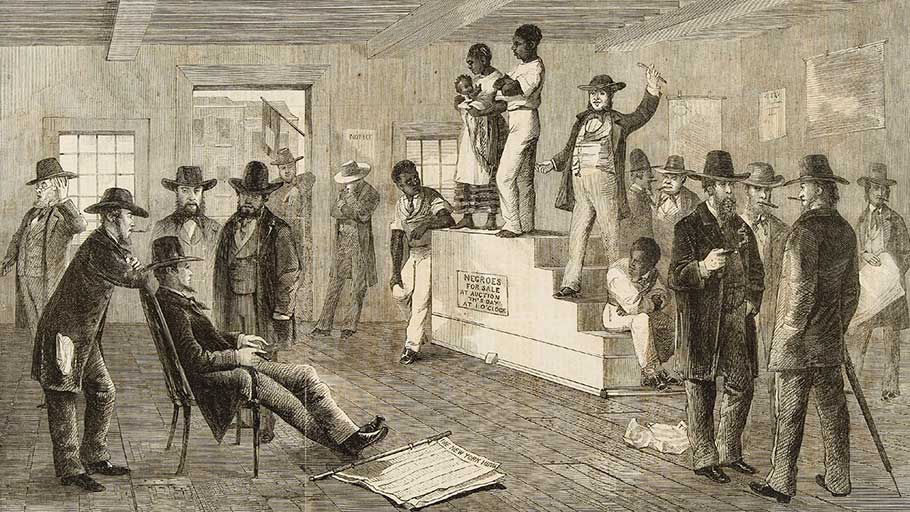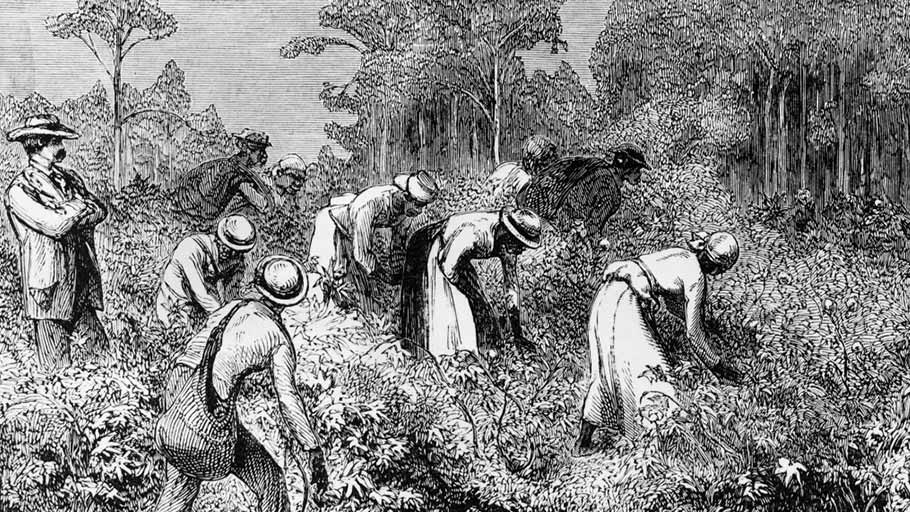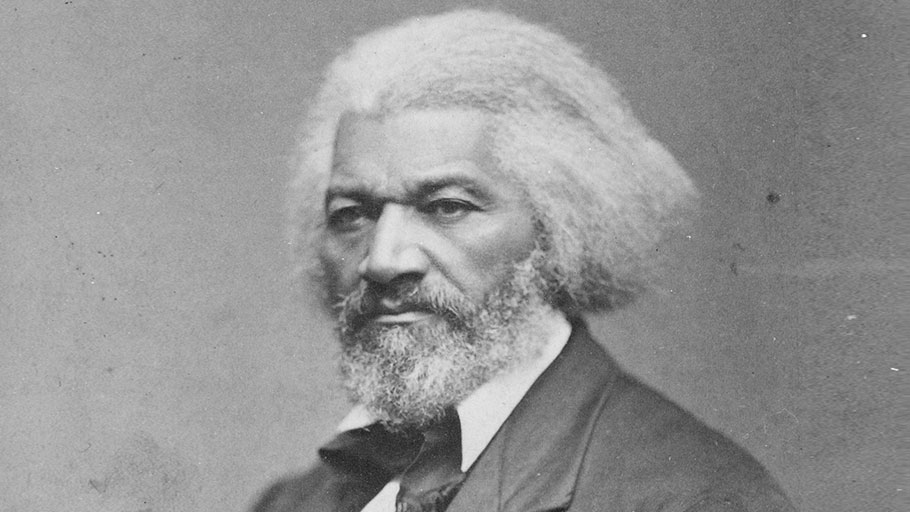The great abolitionist and former slave Frederick Douglass died 125 years ago. Jacobin published never-before-transcribed articles from Frederick Douglass’ Paper denouncing capitalism and economic inequality.
Everyone knows that Frederick Douglass, who died 125 years ago today, was a fierce opponent of slavery and a powerful champion of freedom, justice, and equality for all. But when it comes to Douglass’s concrete political views, things are more complicated.
For some scholars, Douglass’s commitment to individual rights mark him, as David Blight has written, as “both a radical thinker and a proponent of classic 19th-century political liberalism.” His ambivalence toward capitalism, which he both denounced and defended, muddies the picture. Recently, some on the Right — and not just the clueless Donald Trump — have sought to make Douglass their own, arguing that “Frederick Douglass Hated Socialism,” and claiming the militant abolitionist as a libertarian hero.
That is a strange way to describe an antislavery leader who devoted his life to seeking the forcible expropriation of property worth more than all antebellum America’s factories, railroads, and banks combined. But the truth is that Douglass’s long political career was rife with contradiction. For half a century, he moved between outside agitation and mainstream political engagement; between pessimism about the depth of American racial oppression and an optimistic faith in struggle and progress; between a wary liberal individualism and a bolder embrace of utopian socialism, working-class struggle, and interracial labor organizing against the “tremendous power of capital.”
No single document, of course, can solve the riddle of Douglass’s complex political ideas. But while doing research at Yale’s Beinecke Library, I came across two articles in the 1856 Frederick Douglass’ Paper that have not, to my knowledge, been reprinted or digitized since. (Most of Douglass’s journalistic writing remains unpublished, though a forthcoming volume in the Frederick Douglass Papers should help address that problem.) Nor have they been excerpted, quoted, or discussed at length in the extensive scholarship on Douglass.
Both articles, “The Accumulation of Wealth” and “The Land Reformer,” help shed new light on how Douglass saw the relationship between economic inequality and political democracy in the 1850s. They also demonstrate that in the age of Trump and Michael Bloomberg, Frederick Douglass has much to teach us today — not only about racism and civil rights, but the acute dangers posed by “the unlimited hoarding of wealth,” and the hard truth, still sidestepped by many liberals today, that true political freedom is only possible under conditions of material equality.
In both pieces Douglass embraces the position, held by many eighteenth- and nineteenth-century Americans (though remarkably few establishment Democrats today), that “wealth has ever been the tool of the tyrant, the readiest means by which liberty is overthrown.” He anticipates arguments that “unbridled accumulation” is simply a part of human nature: in fact, the “mighty machine” of capitalist society is an innovation, which compels, rather than reflects, acquisitive behavior. And he rejects the idea that poverty is an unchangeable fact of social life: it is, rather, the “consequence of wealth unduly accumulated.”
What is perhaps most striking here, however, is the underlying assumption that it is the duty of democratic politics to “minister” to the problem of economic inequality. Individual philanthropy, however noble, can never address the root of the problem. In fact, the highest aim of “the true statesman” is to devise measures that eradicate poverty, prevent “the undue accumulation of wealth,” and create an egalitarian economy where “no one” is either rich or poor.
This is strong stuff. To be sure, Douglass does not advocate anything like a fully planned economy, or the restriction of “private enterprise.” Yet the economy of true equals that these articles imagine, and the measures they propose to achieve it — including laws that forcibly limit the accumulation of productive property — goes some distance further than even the most ambitious plans of our left-wing leaders today.
What follows are excerpts from the two articles.
“The Accumulation of Wealth,” Frederick Douglass’s Paper, November 28, 1856

The Spartan lawgiver who discouraged the accumulation of wealth, because of its tendency to impair the liberties of his country, was fully justified in the extreme measures he adopted, by the universal experience of nations, and the fate of his own country; the fall of Spartan liberties dating from the introduction of wealth and consequent luxury of her citizens.
His aim to exterminate wealth and refinement entirely, was, perhaps, not wise; it is not wealth of itself that produces the dreaded effects, but its accumulation in the hands of a few — creating an aristocracy of wealth, ready to be the tool of an aggressive tyranny, or to become aggressive upon its own account. With an increase of wealth comes an increase of selfishness, devotion to private affairs, and a contempt of public — unless politics can be made to minister to the all absorbing selfishness of the individual.
The advocates of unbridled accumulation claim for their system, that it is founded on nature, that the faculty of acquisition is found existing in man everywhere and in all stages of development; that the world owes much to the enterprise developed by its influence; and that it would be shallow statesmanship to interfere with its action.
We are ready to grant that the condition of man, cast as he is into the world naked, and surrounded by elements unfriendly to his continued existence, renders a degree of acquisitiveness necessary for the security of life; but is it just to plead this moderate degree of accumulation, indicated by nature, in justification of the unlimited hoarding of wealth, and monopolies of land, which has converted the entire civilized world into an abode of millionaires and beggars; which renders the enslavement of the peoples of the world possible, and shrouds the future of liberty with gloom?
To look at the treasures of Paris, or London, or New York, and other centres of wealth, one might at first feel disposed to agree in the assertion that man is acquisitive creature, even in the extreme case claimed by the defenders of the present system, by which wealth is accumulated by the few, instead of being distributed, as it should be, among the mass, rendering none rich, allowing none to remain poor.
A wider range of observation, however, including man everywhere, will show that with the vast majority of mankind, a satisfaction of the wants of nature is all that is sought; and even in those centres of selfishness spoken of, there are vast multitudes who would be thus satisfied, but that the rush and crash of the mighty machine of society compels them, in self-defence, to join in the rush for wealth.
‘Tis the old question, “whether ‘tis better to be a victim or a victimizer,” and they decide against being victims.
Wealth has ever been the tool of the tyrant, the readiest means by which liberty is overthrown. A nation starting with free institutions and customs, begins to increase in wealth, and that wealth to accumulate in the hands of a few, and here is the lever by which, eventually and certainly, the liberties gained in a simpler age will be overthrown.
Wealth is averse to agitation; it abhors revolutions; it calls for peace, at whatever sacrifice. A tyranny of an individual or a class may be winding its subtle meshes around the wealthy, depriving them of the right of unrestrained locomotion, the right of speech, the right of private judgment; but if it leaves them the privilege of grasping and accumulating gold, they are content — nay, will aid the tyranny to subject them who value their liberties enough to struggle for them; for the agitation might endanger their gains …
Louis Napoleon holds his seat today, and other tyrants with him, because they have enlisted the sympathies of capital, by professions of law and order; encouraging and increasing the facilities for growing rich. Say to one of these blinded instruments of tyranny, that personal liberty, the freedom of speech, of thought, of the press, is overthrown; and they will answer you, that commerce flourishes, manufactures increase, public securities are at par. The golden calf set up, they fall down and worship, and shut their eyes to the foul wrongs perpetrated every day on human rights.
Poverty, the natural consequence of wealth unduly accumulated, plays its part in the drama of national degradation. Wherever the palaces tower highest, and enclose within their walls the greatest accumulations of luxury and wealth, there does the peasant grovel lowest in ignorance and misery; there is tyranny most secure and freedom most hopeless …
From whence, in our own country, comes the danger to liberty? Who are the ready tools and apologists of slavery …? The plain answer is, the wealth and the poverty of the nation …. We have the controllers of our commercial centres, blinding or buying the poverty-stricken, ignorant masses that fester in their alleys, to the unblushing support of the policy of slaveholding tyranny ….
Here is a problem worthy of the attention of that noblest of men, the true statesman … to render government a blessing, instead of an evil, borne by the subject, because he fears its overthrow may lead to worse.
If such a statesman shall devise measures, which, while they will not hamper private enterprise, shall yet prevent the undue accumulation of wealth in the hands of individuals or associations, he will have merited and secured a fame more lasting than has yet fallen to the lot of man. He will have founded a nation which, though subject to human vicissitudes, will yet possess elements of prosperity and permanence, such as no nation has yet enjoyed.
“The Land Reformer,” Frederick Douglass’s Paper, August 15, 1856

The deep-seated evil of poverty, with its attendant ignorance, vice, and squalid misery, which are always to be found to be in exact proportion to the splendor of the wealthier class, has always, and must always, attract the attention of the philanthropist, who seeks to remove the cause of the ills that afflict mankind, and not rest satisfied, as too many do, with abating the symptoms.
Can poverty be prevented? If so, how? Must civilization be always like a whited sepulcher, outwardly fair, but within full of rottenness? Can no cure be devised to relieve the poverty-stricken throng, from whose ranks our criminals, male and female, are so numerously found?
Poor houses, soup societies, Ragged Schools, and Five Point Missions are looked to by some to stem the tide of poverty. But what we want is not that poverty shall be promptly relieved, but that it shall at once be removed. Like the purchase of one or two individuals from Slavery, as is frequently done by benevolent-minded individuals within our communities, we are glad to see the manifestation of good feeling; but what we want is a preventative, not an ameliorator. We want the necessity for the purchase of men removed, and so with the necessity of for relieving the poor. We want no poor.
We conscientiously believe that the welfare of the world demands the abrogation of land monopolies. Earth, air, fire, and water are essential to human existence, and should be free to all men, in virtue of their heaven-descended right. What justice is there in the General Government giving away, as it does, the millions upon millions of acres of public lands, to aid soulless railroad corporations to get rich? Or in the laws by which capitalists enter upon the possession of the national domain, and when the thrift and the labor of the pioneer has raised the value of the lands, compel the pioneer, not only to pay the Government price of lands, but also to pay the landlord for the increased value of the land, increased, though it was, by his own labor.
We are aware that whenever these agrarian doctrines are broached, there is a great outcry of vested rights, &c; but the rights with which humanity is invested by the Almighty Creator, are far above, far more sacred, than any composed by human customs or laws. In our country there need be no violence committed on the rights of property. All we need is a land limitation law, an act conferring on the settlers of the public domain, and protecting them against land sharks and speculators. Estates too large for the good of society will, in a few generations, be reduced to moderate dimensions, and none of the violent consequences predicted by the enemies of land limitation be experienced.
We believe that with land limitation Slavery would be impossible. Your slaveholder is ever a land monopolist. We believe the general education of the people would be promoted by land limitation; and the thousands of children who are now toiling in mills and workshops at a time when they should be at school, will be, by their independent parents, placed under instruction and good influences.
Let the means of obtaining homes … [be given to] the young men of the country; they, who … under present arrangements, toil through the best portions of their lives ere they can hope to possess a home; and before a single generation the beneficial effect can be felt. Multiply the free homes of the people; let each man have around him the blessed influences of family and home, and the rampant vice and rowdyism of our country will disappear.
This article was originally published by the Jacobin.
Frederick Douglass was born into slavery in 1818 in Talbot County, Maryland. He became a leader in the abolitionist movement and one of the leading social reformers, orators, and authors of his time.
Read the full Frederick Douglas articles published by Jacobin here.















